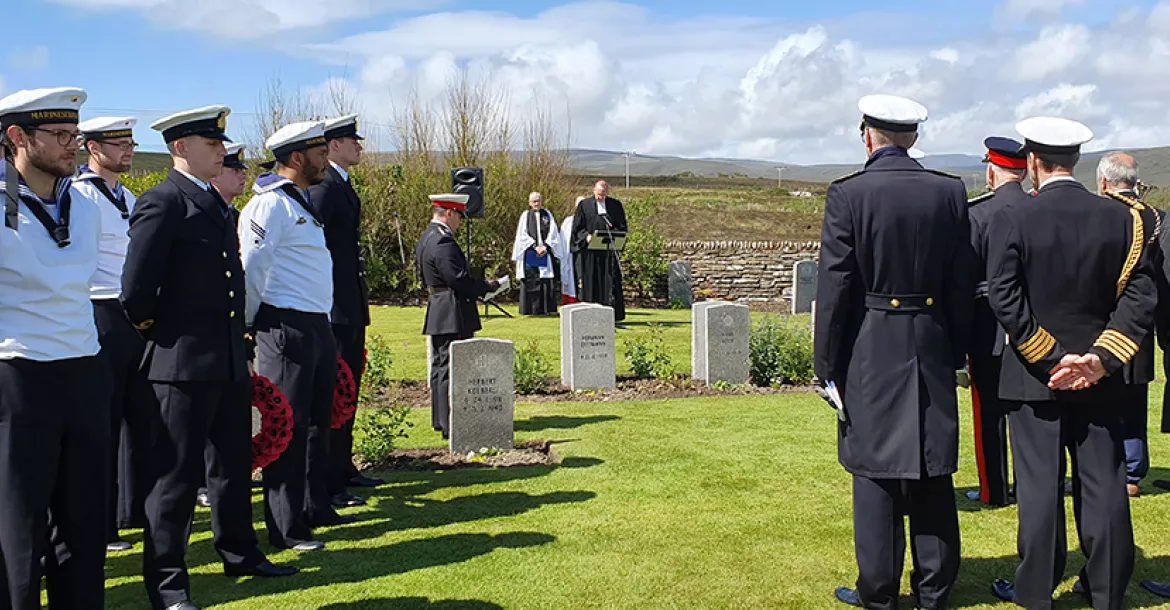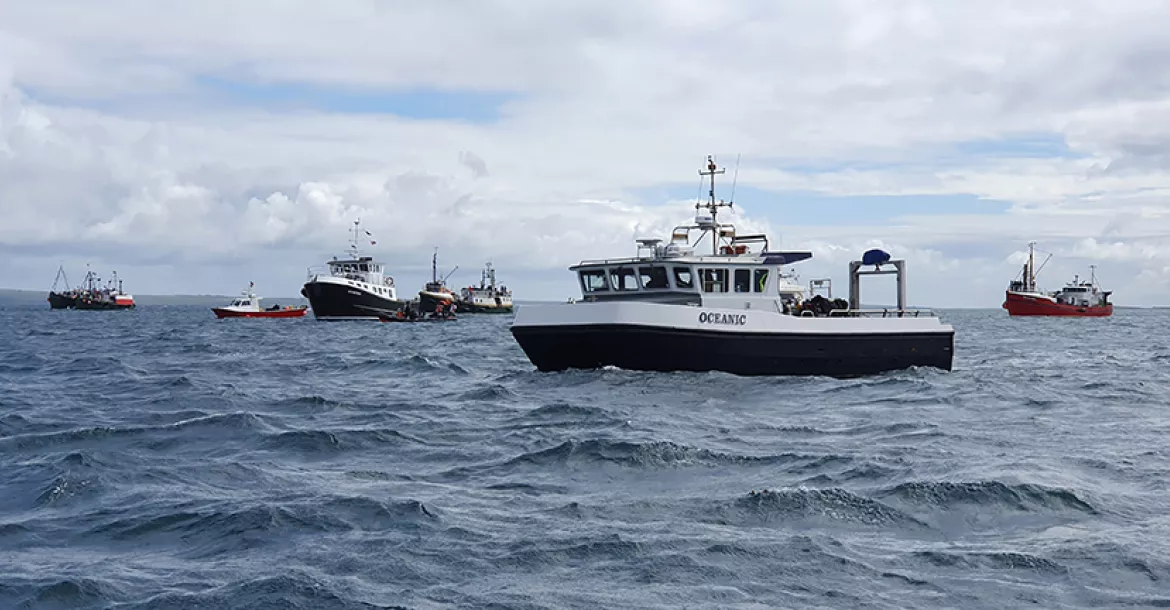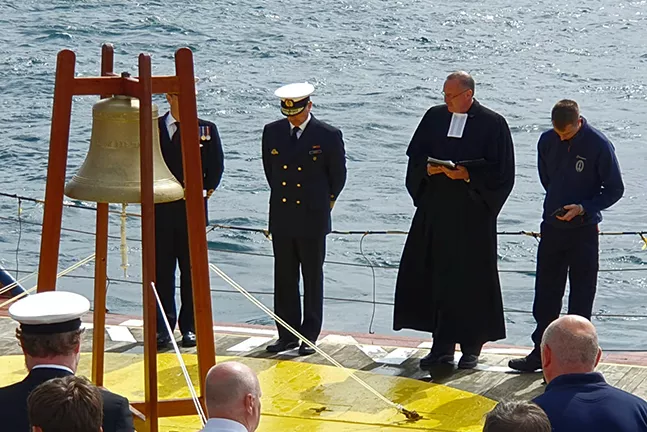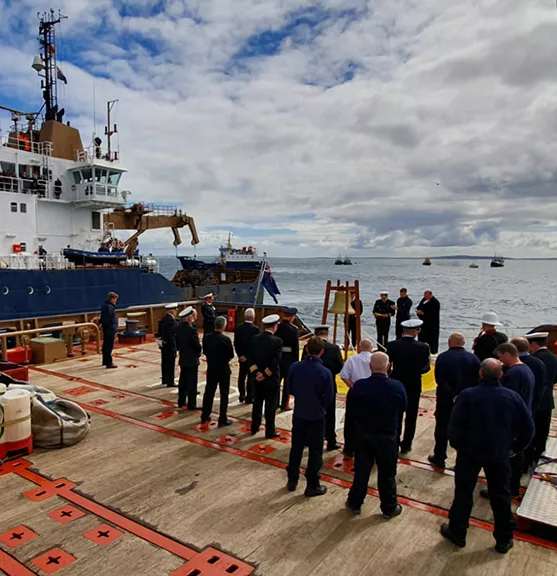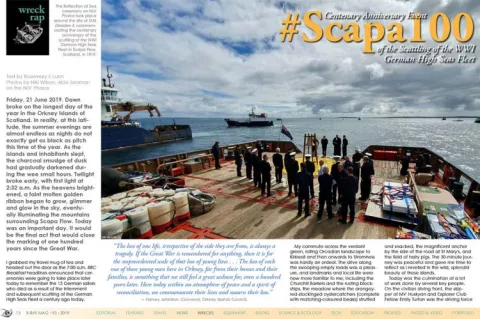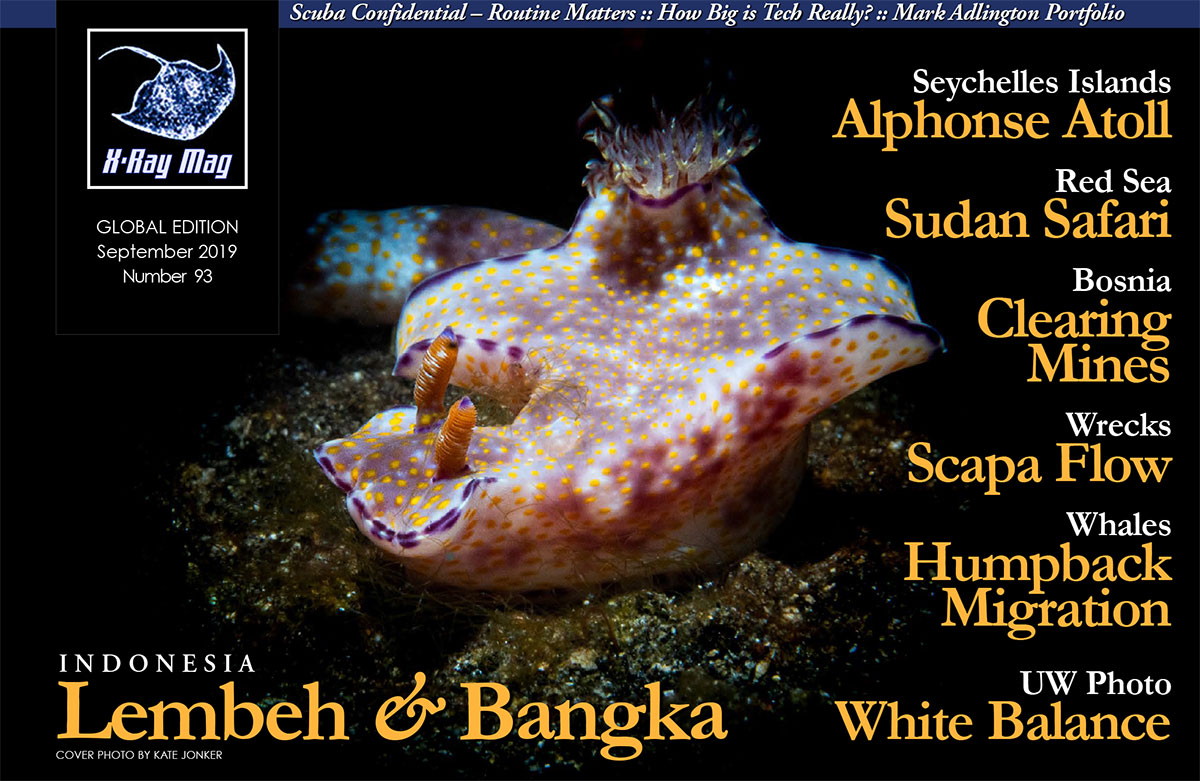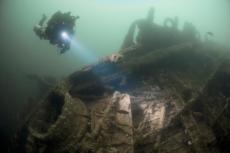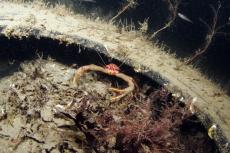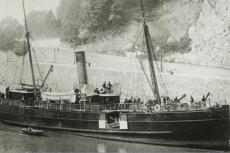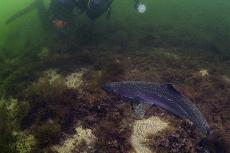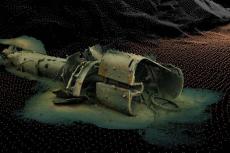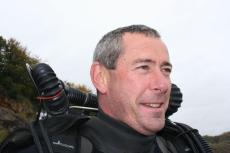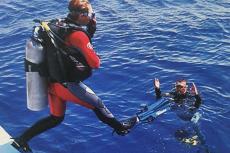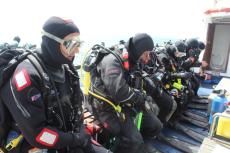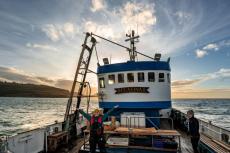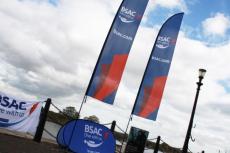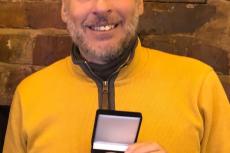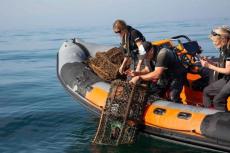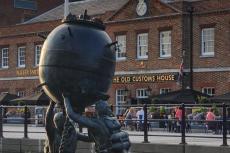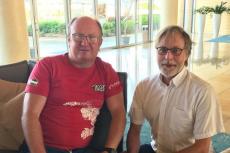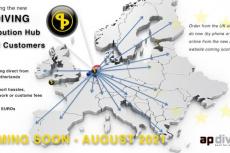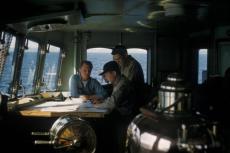Friday, 21 June 2019. Today was an important day. It would be the final act that would close the marking of one hundred years since the Great War.
Contributed by
Dawn broke on the longest day of the year in the Orkney Islands of Scotland. In reality, at this latitude, the summer evenings are almost endless as nights do not exactly get as black as pitch this time of the year. As the islands and inhabitants slept, the charcoal smudge of dusk had gradually darkened during the wee small hours.
Twilight broke early, with first light at 2:32 a.m. As the heavens brightened, a faint molten golden ribbon began to grow, glimmer and glow in the sky, eventually illuminating the mountains surrounding Scapa Flow.
I grabbed my travel mug of tea and headed out the door as the 7:00 a.m. BBC Breakfast headlines announced that ceremonies were going to take place later today to remember the 15 German sailors who died as a result of the internment and subsequent scuttling of the German High Seas Fleet a century ago today.
“The loss of one life, irrespective of the side they are from, is always a tragedy. If the Great War is remembered for anything, then it is for the unprecedented scale of that loss of young lives . . . The loss of each one of these young men here in Orkney, far from their homes and their families, is something that we still feel a great sadness for, even a hundred years later. Here today within an atmosphere of peace and a spirit of reconciliation, we commemorate their lives and mourn their loss.”
— Harvey Johnston, Convenor, Orkney Islands Council.
My commute across the verdant green, rolling Orcadian landscape to Kirkwall and then onwards to Stromness was hardly an ordeal. The drive along the swooping empty roads was a pleasure, and landmarks and local life were now more familiar to me, including the Churchill Barriers and the rusting blockships, the meadow where the orangey-red-stockinged oystercatchers (complete with matching-coloured beaks) strutted and snacked, the magnificent anchor by the side of the road at St Mary's, and the field of hairy pigs. The 30-minute journey was peaceful and gave me time to reflect as I revelled in the wild, splendid beauty of these islands.
Today was the culmination of a lot of work done by several key people. On the civilian diving front, the skipper of MV Huskyan and Explorer Club Fellow Emily Turton was the driving force behind the #Scapa100 event commemorating the centenary aniversary of the scuttling of the WWI German High Seas Fleet in Scapa Flow. She had collaborated with the Orkney Islands Council, Stromness Museum, Newcastle University, University of Dundee, Deerness Distillery, the Royal Navy and the German Navy. As a result, an imaginative programme had been created to commemorate the impact and the lasting legacy that the scuttling of the squadron has had on the islands.
A gathering of the fleet
At 11:00 a.m. today, a Reflection at Sea ceremony would be conducted around the site of SMS Dresden II. Dive charter boats, along with ancillary craft, including the Orkney Ferries vessel Thorsvoe and the Longhope Lifeboat, came together in a crude circle of 19 craft with the two much larger ships from the Northern Lighthouse Board, Pharos and Polestar.
From a radio on one of the dive boats, which I was aboard, I could catch snatches of the service being conducted on the back deck of the Pharos. “Strive for full restoration, encourage one another, be of one mind, live in peace. And the God of love and peace will be with you,” read Militärdekan Christoph Sommer, Chaplain of the Fleet of the German Navy, from Corinthians, before the Last Post was played. As the notes died away, Bowswain Dave Steedman got ready to lower Pharos’ ensign.
“It is a great honour to perform this duty, and an emotional moment for myself and my three sons, Alexander, Dominic and Emanuel. It is important to commemorate these wartime events so that they can be remembered by future generations.”
— Yorck-Ludwig von Reuter
Tolling of the bell
Across the water from the back deck of Pharos, almost 100 years to the hour, came the sound of the salvaged Von der Tann bell, rung by Yorck-Ludwig von Reuter (the grandson of the Rear Admiral Ludwig von Reuter who ordered the scuttling of the German High Seas Fleet interned in Scapa Flow 1919). One, two, three... I counted the strikes—seven in total, to mark the number of the High Seas ships. It was a big bell, but the sound did not resonate as brightly and as strongly as I expected it to. The unique sound of the Von der Tann bell had not been heard on Scapa Flow for 100 years.
Last time, it signalled the destruction of the German High Seas Fleet. Today, the tolling of the bell marked the start of a minute’s silence. We stood quietly, hove to. Water slapped against the side of the boat, and I thought about the 5,000 Germans on their rusting floating prisons. Reveille was sounded and the ensigns were raised before Rear Admiral Stephan Haisch from the German Navy and Captain Chris Smith, Royal Navy Regional Commander for Scotland and Northern Ireland, “lay commemorative wreaths.” In reality, they threw the two wreaths off the stern of Pharos.
After the ceremony, both naval officers spoke to the Orcadian newspaper. Rear Admiral Haisch said: “I am deeply honoured that today, 100 years after Rear Admiral Ludwig von Reuter issued the order to sink Germany’s fleet, I have been invited as a representative of Germany by Orkney Islands Council to commemorate the German sailors who lost their lives in Scapa Flow 100 years ago. “I am deeply touched by the heartfelt commemoration service that was organised by the people of Orkney.
Commemorating what happened here 100 years ago also brings to mind how far we have come since those dark days. How from enemies we, the United Kingdom and Germany, have become true friends. Today, our nations stand side by side on the world stage, upholding the joint values we believe in.” Captain Smith said: “The Royal Navy has a long history with Orkney and Scapa Flow, and has supported many of the First World War commemorations of the past four years.
It is quite fitting that we are completing that series of events here in Orkney, recognising the importance of the scuttling of the High Seas Fleet and just as significantly paying our respects to the memory of the 15 German sailors who lost their lives. “I am honoured to stand alongside Rear Admiral Haisch in friendship on this day, looking back to a time when our countries were not as close as we have since become—and to represent the Royal Navy as we complete the task of commemorating the sacrifice made by so many during the course of what we now call the First World War.
“We have carried out that task, and that period in our history is now far better understood and more widely known as a result, and those who gave their lives have indeed been remembered, which is the duty we have and will continue to perform. “Today has seen sailors of both the Royal Navy and the German Navy jointly recognised as a part of our collective history and doing so as allies, demonstrating that out of the adversity which once divided us, we have forged a lasting friendship, which I think is the best tribute we can pay to those whose memory we honour on this day.”
Commemorative dive on Dresden
Over on the adjacent MV Huskyan, two teams of divers from their respective navies—the Royal Navy Northern Diving Group (NDG) and the Deutsche Marine Seebataillon Minentaucherkompanie (the German Navy’s Sea Battalion Mine Diver Company)—were preparing to dive the Dresden. It was a rare shared act of commemoration by both nations. There had been a temporary diving embargo in place on this wreck in preparation for this morning’s ceremony. I later caught up with Turton to find out why this particular wreck had been chosen.
“The Navy divers have to dive within certain parameters, and they can dive for 28 minutes on this wreck,” said Turton. “Secondly, Orkney Islands Council owns this wreck. Therefore, getting permission to attach two wreaths, and fasten and fly the German ensign from her was straightforward. And the Dresden does have a very pretty bow.”
The Navies were joined by a civilian support dive team—Marjo Tynkkyn (photographer), Kari Hyttinen (videographer), Caroline Appleyard (underwater artist), Chris Rowland (underwater lighting) ), Emily Turton (underwater lighting), Clare Fitzsimmons (underwater lighting) and Nick Butcher (ensign wrangler)—to help capture the event underwater.
I then asked Turton what it was like to watch the German and Royal Navy divers shake hands after unfurling the ensign. She said it was a moment to remember. “It is always a pleasure to dive with NDG, but on this occasion I feel both honoured and humbled to have witnessed a powerful symbol of reconciliation as the two divers shook hands in front of the ensign.”
On the military front, closed-circuit rebreather (CCR) diver Lieutenant Jennifer Smith, Deputy Naval Liaison Officer for Scotland and Northern Ireland, also played a key role in the #Scapa100 event. She joined the civilian support dive team to illuminate the ensign underwater and co-ordinate the Reflection at Sea service, as she was responsible for the diving element of the ceremony.
Smith said that it had taken months of meticulous planning. “It was an absolute privilege to be involved and a humbling experience to be able to bring all the elements together in the way that we did. To see 19 boats together for the commemoration was really striking, as they numbered a quarter of the 72 ships that went down on 21 June 1919.”
With the Reflection at Sea service finished, there was another ceremony on the island of Hoy that I had dearly wanted to attend. In the afternoon, a land ceremony would be held at Lyness in the Royal Naval Cemetery by the Commonwealth War Graves.
Land ceremony
It was obvious that a lot of work had gone into the afternoon ceremony. It was a well-structured, thoughtful, inclusive service with lots of small touches by both the British and German representatives.
The two dive teams had rapidly changed out of their diving kit, donned their uniforms and were now standing in two lines on the shorn lawn as Rev. David Dawson RNR, Chaplain to the Sea Cadet Corps of the Royal British Legion Kirkwall Branch and the Royal Naval Association Orkney Branch, welcomed everyone to the Lyness Royal Naval Cemetery. A few steps away, four men carried the German flag, the British naval flag, and the Kirkwall and Stromness British Legion flags.
The ceremony took about an hour and included the very relevant hymn for so many of us: “For those in peril on the sea.” German and Royal Navy representatives gave readings, and the three clergy (Rev. Dawson, Militärdekan Sommer and the Venerable Martyn Gough) led the prayers. I found it particularly moving that Matthias Schmidt, Captain of the German Navy and Naval Attaché of the Embassy of the Federal Republic of Germany, read The Exhortation, an excerpt from a poem by Laurence Binyon:
“They shall grow not old, as we that are left grow old; Age shall not weary them, nor the years condemn. At the going down of the sun and in the morning We will remember them.”
Remembrance
Over the years, I have discussed the act of remembrance with quite a few Germans, most of whom have been divers. In the United Kingdom, we have Remembrance Sunday (the closest Sunday to 11 November), and we stop for a two-minute silence on Armistice Day at the 11th hour, on the 11th day, of the 11th month, to remember our War Dead from all campaigns.
The Germans have Volkstrauertag ("people's day of mourning"), commemorating those who died in armed conflicts, including members of the armed forces of all nations and civilians. I am not going to get into semantics of war here, but I believe that remembering a previous generation’s service to their country does not glorify war. It reminds us that we have to find peaceful solutions where and when we can.
I personally struggle with the fact that thousands of men died on both sides, and not all of them are remembered on an annual basis in both countries. Each of these men was someone—a son, a husband, a brother, an uncle, a friend, a colleague or a best mate. For this reason, having a German officer read the Exhortation on the centenary of the scuttling made it even more special for me.
We stood in silence in brilliant sunshine, buffeted by the wind. If I shut my eyes, I would not know I was surrounded by 200 other souls. There was not a sound to be heard from the Naval Divers, the Royal Marines Band, the local school children, the official representatives, a rabble of divers and the general public.
It was time to remember the 15 Germans who lost their lives during the internment and as a result of the scuttling. A hushed cemetery listened as Militärdekan Sommer read out each name and their rank in German, before Rev. Dawson repeated the same in English:
Marine Engineer Max Aumüller, 29 November 1918
Leading Stoker Jabusch, 6 December 1918
Stoker Johannes Thill, 7 December 1918
Telegraphist Friedrich Bonneder, 4 January 1919
Stoker Albert Haushälter, 11 March 1919
Petty Officer Otto Hinte, 7 April 1919
Lieutenant-Commander Walther Schumann, 21 June 1919
Warrant Engineer Wilhelm Markgraf, 21 June 1919
Chief Engine-Room Artificer Gustav Pankrath, 21 June 1919
Chief Engine-Room Artificer Friedrich Beicke, 21 June 1919
Chief Petty Officer Hermann Dittmann, 21 June 1919
Yeoman of Signals Hans Hesse, 21 June 1919
Stoker Karl Bauer, 21 June 1919
Stoker Karl Funk, 22 June 1919
Engineer Apprentice Kuno Eversberg, 29 June 1919
Kuno Eversberg was the last person in the armed forces to die at the very end of World War I.
School children then and now
On the morning of the scuttling of the German High Seas Fleet in 1919, a party of schoolchildren from Orkney were taken out on The Flying Kestrel to take a closer look at the interned squadron as a special treat. It meant that they were able to experience this extraordinary historical moment. Some children were terrified, others thought that the ships were being sunk especially for them. What it is to have the active imagination of a child!
It was therefore great to see that pupils from North Walls Community School had been invited to take an active part in the service at Lyness, and they sang “Let there be peace.” Lachlan Maclsaac (a pupil at the school) read from John Tulloch’s account of the sinking. Tulloch was a young child at the time and had watched the scuttling from the island of Cava. After the laying of wreaths, the UK and German national anthems were played, and the headstones rededicated.
The ceremony was over. As we broke up and started walking back down the harbour, I bumped into Yorck-Ludwig von Reuter and his sons. The last time I saw the family was 15 years ago. It was a joyous meeting and made my #Scapa100 truly special. ■

